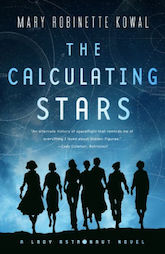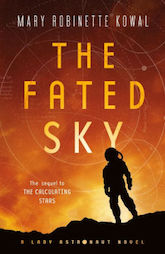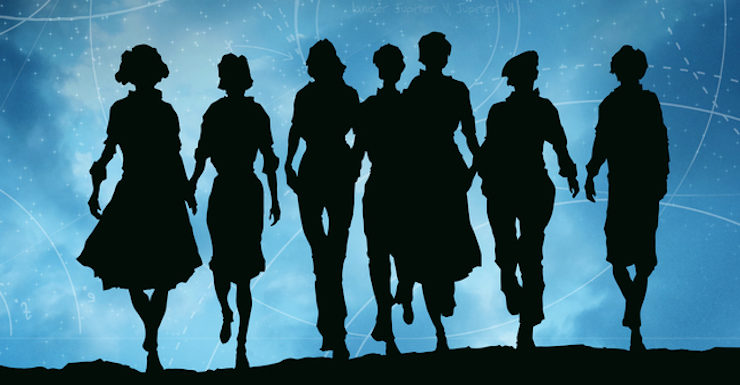Mary Robinette Kowal’s novelette “The Lady Astronaut of Mars” won the 2014 Hugo Award in its category. Now Tor Books brings us a pair of novels about Elma York’s life before her final mission: even before Mars.
The simplest way to describe Mary Robinette Kowal’s The Calculating Stars and its sequel, The Fated Sky, is as an alternative history of the American space programme. But that’s not all it is: it’s a story about a young Jewish woman with an anxiety disorder using all the tools at her disposal to gain a place for herself in the astronaut programme, and building coalitions with other women to bring them with her. (It’s also a story about how that young woman, Elma York, benefits from white privilege and puts her foot in it with thoughtless bigoted assumptions, and how she keeps trying to learn better.)
Buy the Book


The Calculating Stars
In 1952, a giant meteorite strikes earth just off the coast of Maryland, USA. The resulting cataclysmic explosion (and tidal wave) destroys much of the American east coast, including Washington DC. Elma and her husband Nathaniel survive due to being far away, on holiday in a mountain cabin, but Elma loses many of her surviving relatives to the tidal wave. Worse than the devastation of the initial strike, however, are the results that Elma and her brother, meteorologist Herschel, calculate that the strike will have on the earth’s atmosphere: after a brief period of extreme cold temperatures, the atmosphere will heat to the point where it will become uninhabitable for human life (just like our climate change problem, but even faster), and there’s no way to tell whether mitigation efforts will work until it’s too late.
In consequence of Elma and Herschel’s calculations, the US government invests in space exploration with an eye to space colonisation. The effort becomes international, and Elma’s mathematical skills (and her husband’s role as chief engineer) mean she’s guaranteed a place in the International Aerospace Coalition’s space programme as a calculator. But Elma’s a pilot, too, and she’s determined to win a place for herself to fly.
The Calculating Stars charts Elma’s journey to becoming an astronaut, as she struggles with sexism and bigotry (the bigotry includes her own assumptions about black men and women), and with her own anxiety and intense dislike of the spotlight, to win a place for herself and for other women as real astronauts.
The Fated Sky continues the story of The Calculating Stars, following Elma through selection for the first demanding multi-year mission to Mars, in which bigotry and public relations continue to play a large role—and on into space, separated from her husband and any community bar the one that comes with her by unimaginable distances. With everything about the mission held in fragile balance, Elma must negotiate her steps carefully to help as many people as possible survive to go home again.
Buy the Book


The Fated Sky
Kowal’s writing is smooth and compelling, and her characters come to life on the page. Her enthusiasm for the analogue details of pre-mechanical-computing spaceflight is detailed and infectious. But though Kowal doesn’t portray the past as free from racism and bigotry, her vision of a post-cataclysmic United States in the 1950s is fundamentally optimistic and invested in a progressive vision of human history. It seems a little unbelievable that a country still under the grip of laws that partially inspired Nazi Germany (Jim Crow) and dealing with an enormous economic and human toll would be as susceptible to moral suasion and Elma’s particular brand of advocacy as Kowal’s alternative past.
But perhaps that’s the point: Kowal’s novels are kind, about—largely—decent people, most of whom aren’t (or, at least, who don’t think of themselves as) personally strongly racist even if they’re pretty sexist, and who learn to do better, or at least keep quieter. It’s an optimistic vision that does its best to make you feel good about space and the possibilities of human achievement without pretending everything is easy for everyone, and that’s… something.
I’d like to be more enthusiastic about these novels. I enjoyed them a hell of a lot. But right now, I’m finding it difficult to see optimistic visions of past futures with much sympathy, when I so desperately want optimistic visions of the future past today.
Liz Bourke is a cranky queer person who reads books. She holds a Ph.D in Classics from Trinity College, Dublin. Her first book, Sleeping With Monsters, a collection of reviews and criticism, was published in 2017 by Aqueduct Press. It was a finalist for the 2018 Locus Awards and is nominated for a Hugo Award in Best Related Work. Find her at her blog, where she’s been known to talk about even more books thanks to her Patreon supporters. Or find her at her Twitter. She supports the work of the Irish Refugee Council, the Transgender Equality Network Ireland, and the Abortion Rights Campaign.











I loved the novelette; it had a lot of heart. I definitely have to check out the novels.
Very nice turn of phrase in the final sentence. Please, do share your findings of optimistic visions of the future past today, I really need those kind of stories and I’m not really finding them.
I read the title as “Sleeps with Astronaut Ladies,” which is a thing in this book. I did find it to be insufficiently gay, however (not a knock against the author, my definition of sufficient gay is rather a lot). Though I may have missed any Sapphic subtext and I have suspicions about a certain character which I expect to be confirmed or denied in the second book.
Mary Robinette Kowal talked about this book on the podcast Writing Excuses and it was really interesting. The issue the book is meant to address is global warming. All fantasy and science fiction is addressing the time it was written in, regardless of the setting.
Much of this sounds tempting, but so far I couldn’t bring myself to read an optimistic novel that starts out with Earth becoming uninhabitable. I’m kinda attached to Earth.
On a side note, while I’m worried about global warming, I don’t think that it will render Earth uninhabitable unless the ensuing resource wars turn nuclear.
I very much enjoyed this book, which I learned about after reading the author’s post here about visiting NASA with one of her astronaut advisors and reading the short story. It was refreshing to read about a supportive, sex-positive marriage for once, and I liked how she portrayed Elma’s anxieties as partly coming from the intense pressure of being a high-achieving woman in a STEM field in the mid twentieth century (I’m old enough to remember punch cards). Some elements were a little clunky, like how the politician’s wife manages to make problems go away and the way the women gang up on the “bad girl” at one point, but overall it was very entertaining and thought-provoking. Eagerly awaiting the sequel later this month.
@Liz – I think that one of the key differences for Elma’s new Earth was the Quaker President. It’s almost a throw away line in the first book, yet if you look up the Quakers and their beliefs, they did not endorse racism. They were among early leaders of the abolition moment as well.
Yes, it is very optimistic. Elma is also dealing with a limited section of the population. Her brushes with the general public hint at things not all rosy. I was glad to see the wave of “Red Threat” was all but cut off. I don’t remember seeing a Senator McCathy mentioned.
One thing I found “interesting” is that the Brazilians and the Italians were seen as “white.” That seems to vary around the country now in RL.
Yet I loved the audio book. Mary’s emotions during Elma’s spells were moving and relatable.
@3: Was it supposed to be gay? I don’t remember anything saying it was. If it is confirmed for a character, I think Elma will have her same checking of assumptions she has run into already. Then be positive.
@7 It wasn’t supposed to be gay but I noticed the absence. Unless it wasn’t really an absence. As I said, there’s certain things which I find suspicious about one of the characters.
@8 The Calculating Stars was actually fairly crunchy with hard science. “Identity politics” is the stuff happening around the science fiction.
There’s a number of genres defined by the identity and experience of the protagonists. It’s not that I can’t enjoy a book with the gay in it, I just notice that sort of thing.
AlanBrown @1: I think you’ll like it.
palindrome310 @2: I wish I were seeing more of them, although Carrie Vaughn’s post-apocalypse is lovely, and Bear’s “In the House of Aryaman, a Lonely Signal Burns” is a gorgeous novella.
noblehunter @3: I’m fond of the gay myself. There’s hardly any here at all!
Kate @6: It’s a really great portrayal of high anxiety and the struggles of a female genius. We don’t have enough books like this.
Adam @8: Dude. Duuuuuuuuude. I bet you don’t think social science is science at all, do you? Ah, well. It’s a lovely day to be queer and in love and alive and doing one’s best to engage in anti-racism work, so I’ll head back to that now.
“Myth” of white privilege? Oh, what we have here is a troll. Sometimes they’re adorable, but most of the time they’re just grubbing around in the dirt.
Comment 8 removed–please consult our moderation policy here. Let’s move on, all–thanks.